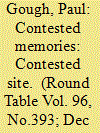| Srl | Item |
| 1 |
ID:
080576


|
|
|
|
|
| Publication |
2007.
|
| Summary/Abstract |
The Beaumont Hamel Newfoundland Memorial is a 16.5 hectare (40 acre) tract of preserved battleground dedicated primarily to the memory of the 1st Newfoundland Regiment, who suffered an extremely high percentage of casualties during the first day of the Battle of the Somme in July 1916. Beaumont Hamel Memorial is a complex landscape of commemoration where Newfoundland, Canadian, Scottish and British imperial associations compete for prominence. A previous paper argued that those who chose the site of the Park, and subsequently reordered its topography, helped to contrive a particular historical narrative that prioritized certain memories over others (Gough, 2004). This argument focused on the premeditated redesign of the 'park' after the Great War, and then again in the early 1960s. Since the publication of the paper the soaring popularity of battlefield tours and visits has placed an intolerable strain on the very land that many regard as sacred and hallowed. A land that took decades to recover and reclaim from violation is now being threatened again both by developers and by crowds of tourists. As a result, measures have been taken to restrict access and control roaming rights. This paper will revisit the original arguments and examine the many tensions that have arisen in one of the most popular destinations on the old battle front. Reflecting on the recent dispute, the paper will explore issues of historical accuracy, topographical legibility, freedom of access, and assumed ownership. It will also try to understand the recent disputes as examples of borrowed 'entitlement' and a resistance (by some British visitors) to recognizing the historic value of Canadian (or more specifically, Newfoundland) heritage.
|
|
|
|
|
|
|
|
|
|
|
|
|
|
|
|
| 2 |
ID:
096481


|
|
|
|
|
| Publication |
2010.
|
| Summary/Abstract |
This article explores how internal borders can become naturalized political instruments that are heavily implicated in the extension of state control over rural populations and rural landscapes. It shows how seemingly innocuous instruments such as national parks and hunting and sport fishing regulations can be utilized to create essentialist ecological arguments for the extension of class and urban-based centers of power. Specific examples of these forms of control are illustrated with material from island Newfoundland to show how neo-liberal agendas have been implemented in the name of ecological conservation. These processes create serious disruptions in the historic political ecology of rural areas and obfuscate the anti-ecological practices of contemporary capitalism and neo-liberal forms of government.
|
|
|
|
|
|
|
|
|
|
|
|
|
|
|
|